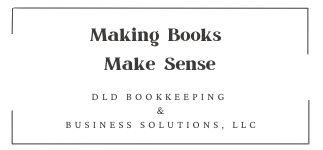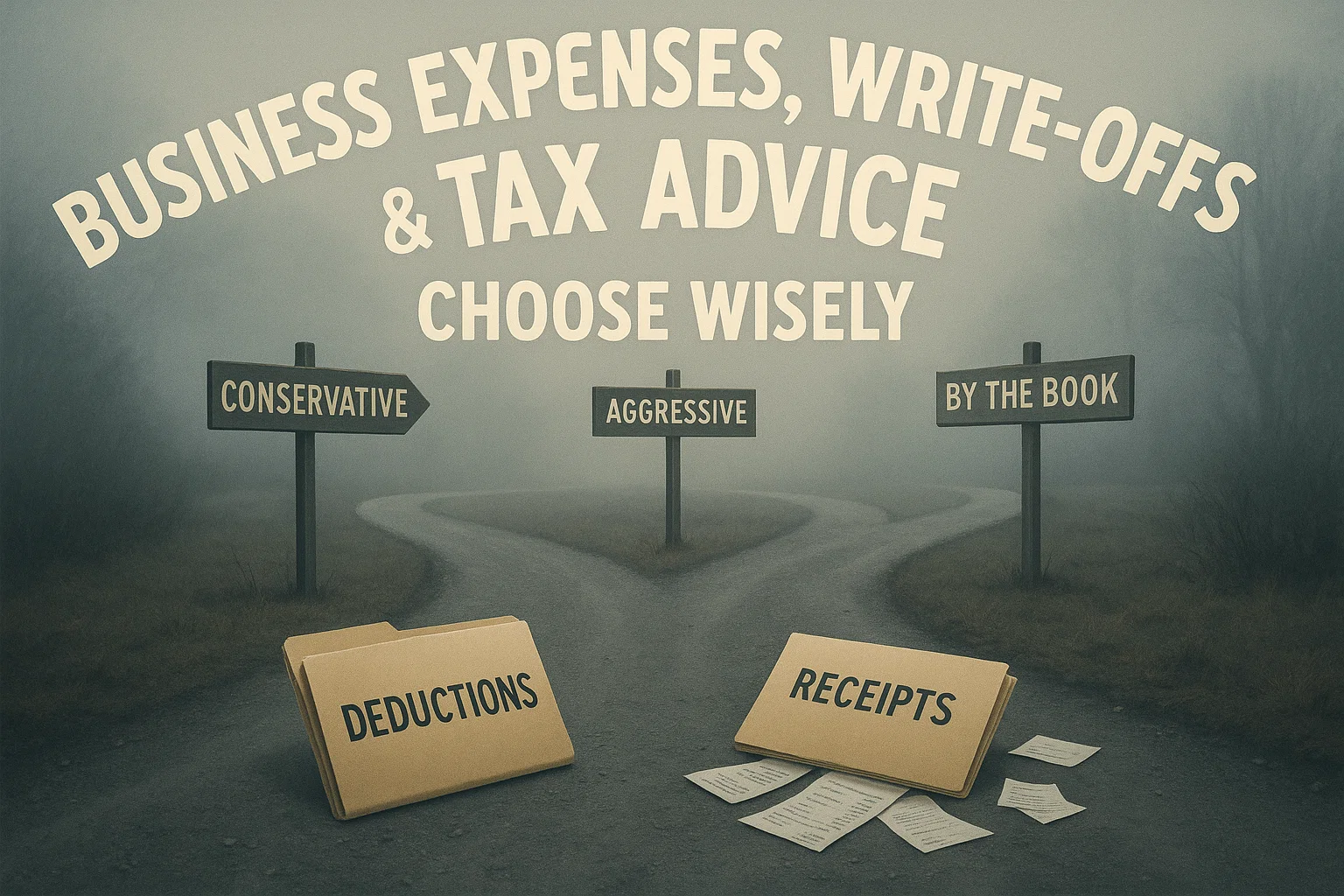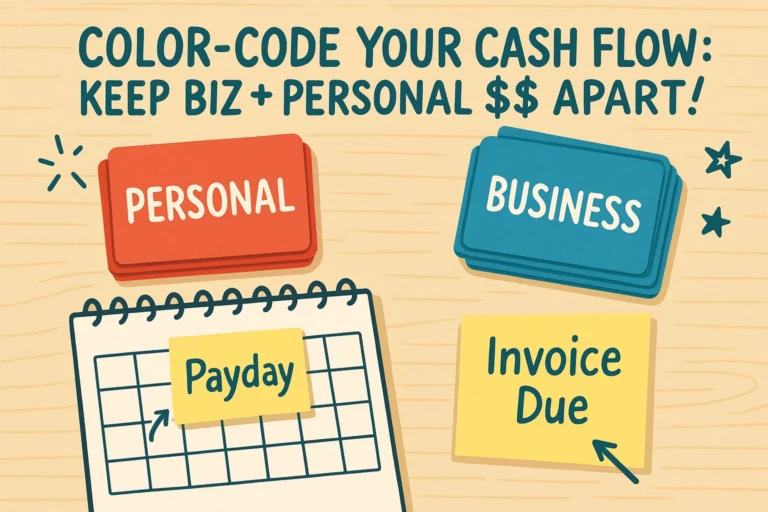Confused by Conflicting Tax Advice? Here’s Why That Happens
In my last post, Think Tax Write-Offs Give You Money Back? Not Quite—Understanding the Difference Matters!, I mentioned that in the end, you as the taxpayer are responsible for what is filed with the IRS.
Why am I telling you this?
Well, for several reasons. In my last post, I mentioned that things like skin care products are not tax write-offs (or said another way, not tax deductible) because they are not required for your business.
Different people might consider the rules for tax deductions differently. I want you to understand what your responsibility is in this process.
Table of Contents
What is considered a tax deductible business expense, or a tax write-off?
The IRS standard for business expenses is whether the expense is ORDINARY AND NECESSARY for your business.
I know there is a lot of misinformation out there on social media, especially Tik-Tok, with advice on just buying this or that and it’s a business expense, but it doesn’t quite work like that.
You might even find a tax preparer that will absolutely write-off every business expense you give them. But at the end of the day (or years, however long it takes the IRS) YOU are responsible to back up those deductions used on your tax return.
Now, what happens if the IRS audits you and says those were not legitimate business expenses? Well, the IRS is going to re-calculate your taxable income, increase your tax liability to what it should have been without those deductions, and THEN they are going to charge you penalties and interest. Sounds fun, right? It’s not. It can also be really expensive to have representation through the audit process.
So, why might a tax professional allow those expenses? Well, that can have several different answers.
There are some tax preparers who aren’t completely…..uh, scrupulous? And they are just concerned with getting your taxes prepared and collecting their fee.
Some tax preparers are more aggressive than others. Again, the standard of ordinary and necessary isn’t quite black and white. If that tax preparer is prepared to argue for you in front of the IRS, then by all means…take all the deductions they agree with you on.
Tax preparers that are more aggressive in their stance with deductions will likely have higher fees for tax preparation and regardless of who you choose as your tax preparer, in the event that you are audited, you will have to pay separately for representation during the audit. That applies whether the person that represents you is the original tax preparer or someone new.
Now even if you hire an aggressive tax preparer and they are willing and able to represent you against the IRS, the IRS can still tell you, and your tax preparer, that you are wrong. Again, you would be responsible for the taxes that were not paid along with the interest and penalties.
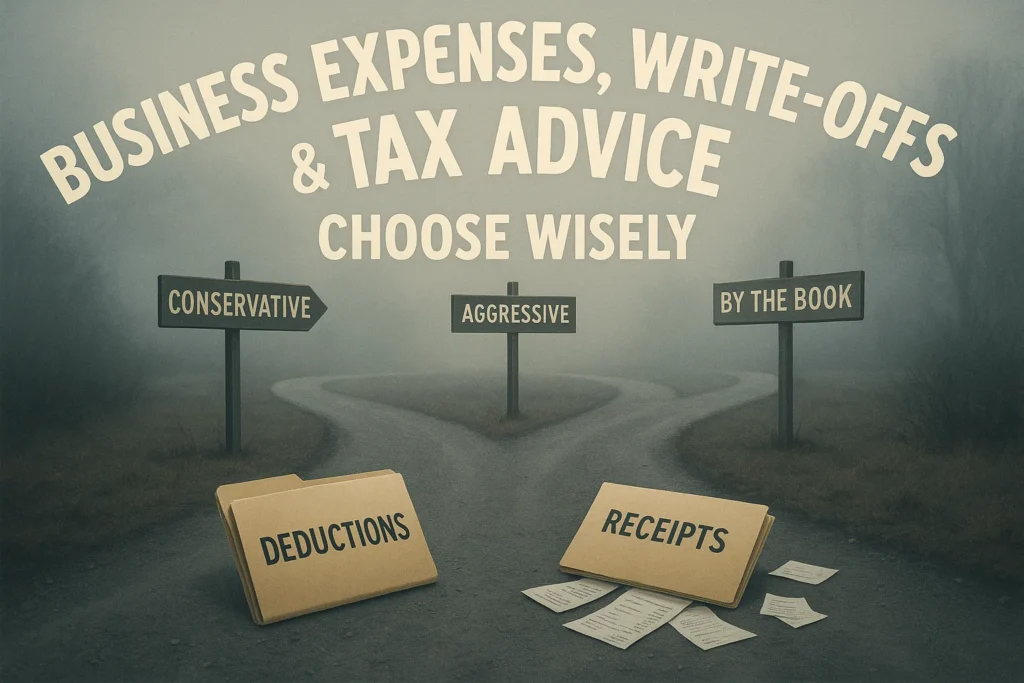
Why are we talking about this?
Remember when you are doing your bookkeeping, something to keep in mind is that in addition to keeping your financial records up to date in order to make good business decisions, at the end of the year your tax preparer will use your bookkeeping to complete your tax return.
There are some tax rules that vary based on what type of business you have: are you set up as a sole proprietor, LLC, S-corp or corporation?
Now if you are a solopreneur working a side hustle, working in the gig economy, or freelancing – you might not have filed any paperwork to set up a business structure. Then by default you are considered a sole proprietor and you file your business income and expenses on a scheduled c with your personal taxes.
Alternatively, you might have formed an LLC as a single member, in which case you are still filing a schedule C.
In both of these cases your bookkeeping is done separately from your personal expenses, you have separate business accounts, and at tax time your business income and expenses are filed on the schedule C which is filed with your 1040 (personal tax return).
What the Schedule C looks like
You can look at the schedule c form and instructions here: https://www.irs.gov/forms-pubs/about-schedule-c-form-1040
Now you can see how the expenses are broken down on the Schedule C and you can see how your expenses will need to fit into the categories.
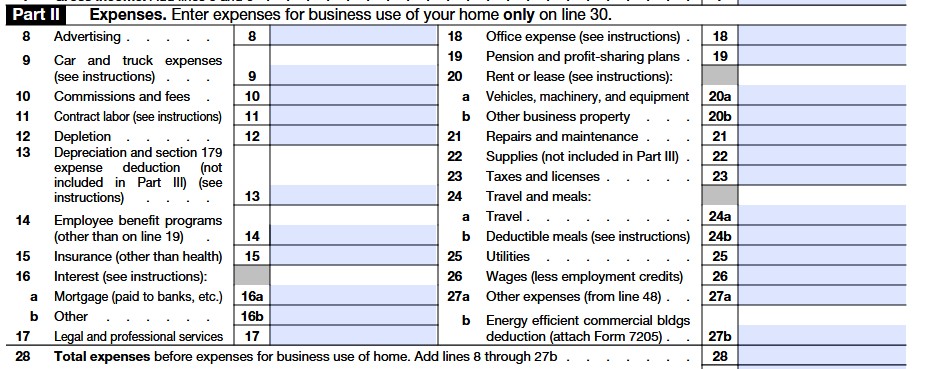
Having your bookkeeping done correctly, makes the tax prep process faster, easier, and hopefully cheaper. Knowing you are categorizing your expenses using the options listed in the photo, means everything should fit into the lines on the form.
So while I only recommend doing your own taxes if you feel you fully understand the process and feel comfortable with it, you should still understand what you are giving your tax professional and what they are doing with the documents.
Also, if you are paying someone for the tax preparation, ask questions!
Now, don’t wait until three days before the tax deadline and start bombarding them with questions, that’s a good way to get fired as a client.
Ask the questions early on. Hopefully you have been following my advice here and your documentation is all nice and neat and ready for tax preparation.
There’s nothing wrong with having a category in your bookkeeping called “ask a professional” or “research more”.
What’s the bottom line here?
Okay, that was a bad pun, sorry.
In the event that you are audited, you need to be able to back up the items you listed as business deductions. You will need receipts and you will need to explain how this was an ordinary and necessary business expense.
If you do decide to do your taxes yourself, I recommend checking out different software. Now that most software is cloud-based, most software providers allow you to go through the tax return and see the results and you only pay when you file.
This can be helpful because you can see the different advice the different software providers give. It is also helpful because the different software programs ask the questions a little bit differently and something might be more clear in one program versus another.
However you decide to complete your tax return make sure you don’t make choices to save money in the short-term that might cost you more money in the long-term.
Resources
To read more from the IRS:
You can view the IRS guidance on business resources: https://www.irs.gov/forms-pubs/guide-to-business-expense-resources
There is also the small business and self-employed tax center available here: https://www.irs.gov/businesses/small-businesses-self-employed
By the way – if you are questioning what is considered a small business, the small business and self-employed tax center from the IRS says businesses with assets under $10 million are considered small businesses.
For more advice on getting your bookkeeping setup and easily maintained:
If you need help getting your bookkeeping started see How to Set Up a Simple Bookkeeping System — Even If You Hate Numbers.
A simple Daily Bookkeeping Routine for Your Small Business is a good read if you are looking for a checklist of items you should be completing.
